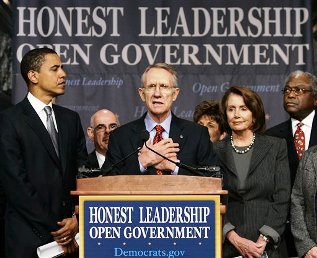The 2007 “Honest Leadership and Open Government Act” was passed in response to a laundry list of scandals involving convicted lobbyist Jack Abramoff. The new law outlines tougher standards for lobbyists in an effort to stop the flow of undue influence in Congress.

That’s a good thing.
There’s just one tiny flaw.
“…former Senator John Breaux, Democrat of Louisiana, said lobbyists [have] already come up with a way around the new law.” According to the Washington Post, They can make a political contribution to a member of Congress, and then have the member pay for the meal. ‘If we call it a campaign contribution, that makes it legal,’ Mr. Breaux said. ‘I can’t buy a $20 breakfast for a senator whom I’ve known for years, but I can give him a $1,000 campaign contribution.’”
That’s not so good.
“Two top lobbyists,” the Post says, “have brought in chefs from the famed California restaurant Chez Panisse to prepare fund-raising dinners at their home for two Democratic senators, Barbara Boxer of California and Tom Harkin of Iowa.
“The campaign committee for Representative John Boehner of Ohio, the House Republican leader, [held] a fund-raiser with him at the new Washington Nationals baseball stadium… The suggested contribution [was] $5,000 for political action committees and $1,500 for individuals.
The New York Times just reported (July 27) that “…lobbyists and trade groups have [given] about $10.4 million to presidential and Congressional candidates in the first half of this year… “[They] gave $181,500 to the campaign committee for Senate Democrats, nearly three times the amount reported in donations to the Senate Republican committee.”
“So far, Mr. McCain… has received more than $181,600 from lobbyists and trade groups, while Mr. Obama has received just over $6,000.”
Senator McCain has repeatedly said that he “is the biggest enemy of special interests in Washington… Brian J. Rogers, a spokesman for the McCain campaign, said that contributions from lobbyists did not compromise the senator’s independence in any way.”
That is about the dumbest thing I have ever heard from someone who presumes to speak for a presidential candidate.
“The policy of the Obama campaign,” the Times reported, “is set forth on its Web site: ‘We don’t take money from Washington lobbyists or special-interest political action committees. Instead, we have a base of more than 1.5 million individual donors who ensure that this campaign answers to no one but the people.’”
Although Senator Obama says they will return any contribution if it learns that it came from a lobbyist, a few have managed to slip through the cracks.
“Donald J. Barry, who was executive vice president of the Wilderness Society from 2000 until early this month, reported that he had given the Obama campaign six contributions totaling $2,050 from January to June.”
We’ll wait and watch if Obama lives up to his word and returns the money.
However, in examining the new, 2008 House Ethics Manual, loopholes remain.
“You as a lobbyist cannot buy me a dinner for $40,” Representative Gary Ackerman, Democrat of New York said, “But if you give a contribution to my campaign, I can take you to dinner, and we can discuss politics or official business… That’s perfectly legal, and it’s perfectly dumb.”
It may be both legal and dumb, Congressman, but it’s also not a positive ethics policy.
While lobbyists and members of Congress are aware of all this, what they should be aware of is that, from the point of view of the people they represent, this is not about meals, gifts, box seats or campaign contributions. It’s about trust.
In fact, the top of page two in the new House Ethics Manual reads:
“Government is a trust, and the officers of the government are trustees; and both the trust and the trustees are created for the benefit of the people.
“These codes provide that Members, officers, and employees are to conduct themselves in a manner that will reflect creditably on the House, work earnestly and thoughtfully for their salary and that they may not seek to profit by virtue of their public office, allow themselves to be improperly influenced, or discriminate unfairly by the dispensing of special favors.”
That’s 85 words. 85 words that pretty much make clear what a member of Congress should and should not do.
Be: Honorable, Earnest, Thoughtful, Worthy of Trust.
Don’t: Allow yourself to be improperly influenced, hand out special favors, unfairly discriminate, use your office for personal gain.
The rest of the 444 pages are the details.
But as we all know by now, that is where the devil resides or in this case, a well-heeled lobbyist. And it is precisely those details where lobbyists, lawyers, and members of Congress get caught up nitpicking, parsing and rationalizing their actions.
How should members of Congress conduct themselves when faced with issues of trust? Tune in Wednesday for two sterling examples.
Comments










